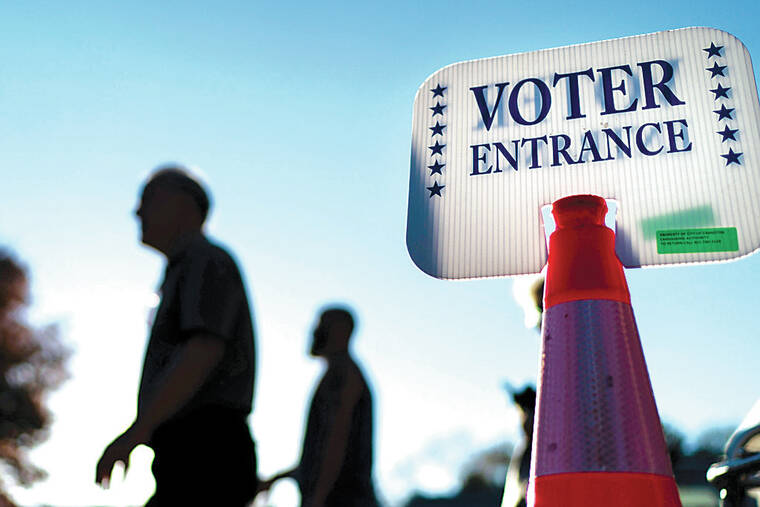WASHINGTON — With the GOP presidential primaries just about to start, many Republicans aren’t certain that votes will be counted correctly in their contest, as pessimism spreads about the future of both the Democratic and Republican parties, according to a new poll from The Associated Press-NORC Center for Public Affairs Research.
About one-third of Republicans say they have a “great deal” or “quite a bit” of confidence that votes in the Republican primary elections and caucuses will be counted correctly. About three in 10 Republicans report a “moderate” amount of confidence, and 32% say they have “only a little” or “none at all.” In contrast, 72% of Democrats have high confidence their party will count votes accurately in its primary contests. Democrats are also slightly more likely than Republicans to have a high level of confidence in the Republican Party’s vote count being accurate.
Republicans continue to be broadly doubtful about votes being counted accurately — in the early contests or beyond them. About one-quarter of Republicans say they have at least “quite a bit” of confidence that the votes in the 2024 presidential election will be counted accurately, significantly lower than Democrats. Slightly fewer than half of U.S. adults overall (46%) believe the same, which is in line with an AP-NORC poll conducted in June.
The skepticism among Republicans comes after years of former President Donald Trump falsely blaming his 2020 loss on election fraud. Federal and state election officials and Trump’s own attorney general have said there is no credible evidence the election was tainted. The former president’s allegations of fraud were also roundly rejected by courts, including by judges Trump appointed.
“Nothing will be fair because the last election was rigged,” said Julie Duggan, 32, of Chicago, a Trump voter, referring to 2020. “I don’t trust any of them at this point.”
The AP-NORC poll found a widespread lack of trust in both major political parties among U.S. adults overall.
About one-quarter of U.S. adults say they have “only a little” confidence or “none at all” that both the Democratic Party and Republican Party have a fair process for selecting a presidential nominee. About half of independents have that low level of confidence in both party’s processes, compared with one-quarter of Republicans and 19% of Democrats.
Slightly fewer than half of U.S. adults — 46% — say they are pessimistic about the way the country’s leaders are chosen.
About half of U.S. adults are pessimistic about the future of the Republican Party, including one-third of Republicans and 45% of independents. The poll found 45% of U.S. adults are pessimistic about the future of the Democratic Party, including about one-quarter of Democrats and 41% of independents.
“The way they’re spending our money, sending it all over the world and not protecting our people here in the United States of America,” said Gary Jackson, a 65-year-old retired trucker and Republican in Boise, Idaho. “Right now, I’m not impressed with either party.”
Christine Allen, a political independent in Gambrills, Maryland, sees her state’s last governor, Larry Hogan, a moderate Republican, as a model for the country. But Hogan refused to run in the GOP presidential primary, which she sees as emblematic of how the two-party system prevents talented leaders from holding office,
“Everybody right now is a bunch of children, stomping their feet until they get their way,” Allen, 44, said. “Everybody’s at fault here. There’s no winners.”
Nonetheless, Allen thinks the primaries will be fair. “They’re fairer than the Electoral College,” she said.
Even those who identify with the two political parties are uneasy about whom their organizations will nominate. A recent AP-NORC poll found that Democrats and Republicans are also not especially confident that their party’s primary contests will result in a candidate who can win the general election in November.
Additionally, there are some doubts on both sides that the emerging candidates will represent their party’s views or Americans overall.

